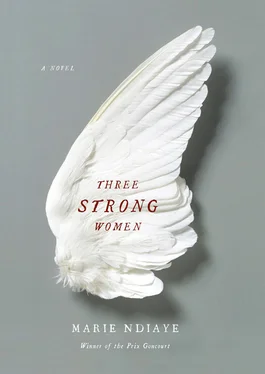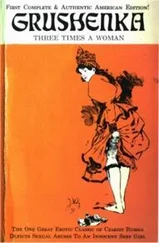Her head was spinning a little.
There was no relief now from the intense pain in her leg. It mingled with a feeling of joy that also appeared to be urging her fiercely onward.
As it moved off, the truck juddered so violently she was nearly thrown from her perch.
Lamine grabbed her in the nick of time.
“Hold on tight, hold on tight!” he shouted in her ear, and close up in the rosy light of dawn she could see his thin, hollow cheeks and the pale chapped lips he moistened often with his tongue, and his eyes: a bit wild, a bit frantic, she thought, like those dark and terrified eyes of a large yellowish dog that had been cornered in the market by women armed with sticks determined to make it pay for the theft of a chicken — Lamine’s were just like the dog’s eyes, filled with innocent terror, that had met hers in the market and pierced her numb, cold heart and had for a brief moment aroused strong feelings of sympathy and shame.
Was it for her that Lamine had been so afraid?
She was to recall, with dull remorse but without bitterness, how very attentive Lamine had been toward her.
She would remember all that, never thinking, however, that he’d sought to deceive her. In thinking back to his concern for her, the sadness she would feel, though at some remove, would be more for him than herself: it would be the boy’s fate that would affect her to the point of shedding a few cold tears, whereas she would judge her own destiny dispassionately, almost with detachment, as if she, Khady Demba, who had never wagered on life as much hope as Lamine did, had no reason to complain about losing everything.
She had not lost much, she would think, insisting with that imponderable pride, that discreet, unshakable assurance, I’m me, Khady Demba, even as she would get up, with sore thighs, the lips of her hot, inflamed vagina still swollen, up from that sad excuse for a mattress — a piece of grayish, stinking foam, actually — that throughout those long months was to be her place of work.
She’d not lost much, she thought.
Because, however great her exhaustion or intense her affliction, she would never regret that period of her life when her mind wandered in the foggy, numbing protective confinement of her frozen dreams, the time she lived with her husband’s family.
Nor would she have missed for anything the years of her marriage when the longing to get pregnant occupied every thinking moment.
Truth to tell, she would regret nothing, even while plunged in the reality of a horrific present that she could see only too clearly, to which she would apply thinking full of both pragmatism and pride (she would never have pointless feelings of shame, she would never forget the value of the human being she was: Khady Demba, honest and true) — a reality that above all she considered transitory, convinced that this period of suffering would have an end, and that while she would certainly not be rewarded (she couldn’t believe she was owed anything for having suffered) she would simply move on to something else. She didn’t yet know what that would be, but she was curious to find out.
As for the chain of events that had brought them — her and Lamine — to this point, she had a precise picture of that and was trying, calmly and coldly, to understand it.
After a day and a night on the road, the truck had stopped at a border.
All the passengers had gotten out, formed a line, and shown their passports to soldiers who shouted one word that Khady did understand even though it was not her language.
Money.
Those who put their hands up to indicate that they had none, or who offered too little, were then so badly beaten that some fell to the ground, where, even lying there, they were sometimes thrashed further by a soldier who seemed mad with rage at this hard job he had of hitting people, the trouble they put him to.
Khady began to tremble all over.
Lamine, next to her, had gripped her hand.
She could see his jaw quivering as if behind those lips shut tight his teeth were chattering.
He’d held out his passport to the soldier and a roll of banknotes, pointing to Khady and then himself.
The man had taken the notes with the tips of his fingers, contemptuously, and thrown them on the ground.
He’d given a soldier an order. The soldier hit Lamine in the stomach.
The boy doubled over and fell to his knees without a word, without a groan.
The soldier had taken out a knife, lifted one of Lamine’s feet and slashed the sole of his shoe. He’d felt the slit, then he’d done the same with the other foot.
And when, with his bony knees knocking, Lamine had straightaway staggered to his feet, as if it was more dangerous to lie prostrate than face his enemy, Khady could see two thin lines of blood running into the dust from under his shoes.
The commander had then turned to her. Khady had shown him the passport that Lamine had procured for her.
Clearheadedly, even though she couldn’t stop shivering, she’d slipped her hand under her batik and drawn out the thin wad of banknotes, which, soaked in sweat all this time in the elastic of her panties, looked like a piece of greenish rag. She had placed the money delicately and respectfully in the man’s hands while clinging tight to Lamine to make it clear that they were an item.
• • •
It was now several weeks — she wasn’t sure how many — that they’d been holed up in this desert town, not where the soldier had slashed the soles of Lamine’s feet but in another one, farther on from their original point of departure, where, once through that first checkpoint, they’d been brought by the truck.
Those travelers who still had money, either because they’d managed cleverly to hold some back or because for some obscure reason they hadn’t been beaten or searched, had been able to pay the driver to take them on the next leg of their journey.
But Khady, Lamine, and a few others had had to stop here, in this town infested with sand, with low sand-colored houses and with streets and gardens covered in sand.
Exhausted and famished, they’d lain down to sleep in front of a sort of bus station where the truck had dumped them.
Other trucks, laden with their human cargo, were waiting, ready to leave.
When Khady and Lamine had awoken at dawn, numb with cold, they were covered in sand from head to foot. Khady’s leg was hurting so much that it seemed to her, in flashes, that her suffering couldn’t be real, that either she was struggling inside the cruelest nightmare of her entire life or she was already dead and was being made to understand that her death was just that: an unbearable — yet abiding — constant physical pain.
The cloth she’d used to bind her calf several days earlier was embedded in the wound.
It was damp under the grains of sand, impregnated by the seepage of a foul, reddish liquid.
She hadn’t the strength to take it off, even though she knew she ought to — all she managed to do was gently move her leg, which was stiff and shot through with pins and needles. In the end she got up, shook the sand out of her hair and clothing.
She hopped around a bit.
On the ground sand-covered shapes were stirring.
She came back to Lamine, who was now sitting up. He’d taken his shoes off and was inspecting the soles of his feet, which the soldier’s knife had cut while searching the boy’s shoes.
A crust of dried blood made a dark line on the hard, broken skin.
She knew that the boy, though in pain, wouldn’t show it or ever speak about his wounds; she knew too that her questioning look would be met only by a deliberately gloomy expression masking his humiliation (oh, how humiliated he was, how sorry she was for him, and how upset too at not being able to take on the humiliation for him, she who could bear it, who was so little affected by it), because what convincing explanation could he give, if not of their failure, at least of such a setback occurring so early in their journey, he who had assured her that he knew the ropes, knew about all the obstacles and dangers likely to be met with on the road?
Читать дальше












